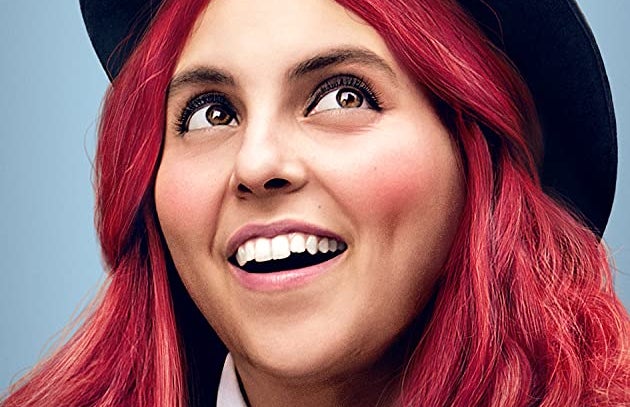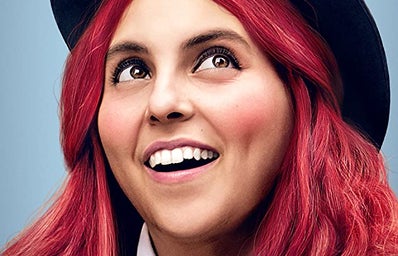It’s amazing what you can change about yourself with some bold hair-dye, lipstick and a top hat. In How to Build a Girl, metamorphosing aesthetics is just one part of reinvention. Johanna Morrigan (played by Booksmart’s Beanie Feldstein), is Brummie, working-class, poor, deeply in love with the world in general, and the soundtrack of Annie in specific. She recreates herself into Dolly Wilde, enfant terrible of Rock and Roll journalism, lady sex-pirate, rocker of some pretty awesome outfits, the coolest person in any room and – to be honest – a bit of an a****hole, who tears apart other people’s music to bring back as spoils of war to the music magazine she works at.
The film is based on the book by Caitlin Moran, a journalist and constant presence on my vision board. If you haven’t read her book How to be a Woman, drop everything and make up for lost time! The film also features the rare holy trinity of films, directed, written and produced by women (Coky Giedroyc, Caitlin Moran, Debra Hayward and Alison Owen respectively) and – by God – it shows. The entire film is feministic, women-loving, girl-respecting and joyous. However, it is not entirely perfect; Beanie Feldstein’s Brummie accent is sometimes shaky, especially in the opening narration, but mind you, as a West Midlands girl myself, any Brummie representation in film makes me want to run about hollering “by order of the Peaky Blinders!!!” through the Bullring, waving a Cadbury’s Dairy Milk.
Some aspects of the book that I loved were unfortunately excised or skimmed over (for instance Johanna’s brother Krissi explaining that, to her much older boyfriend-ish type of guy, age IS just a number. “It’s a number” he keeps saying over and over to himself: ‘I’m f**king a seventeen-year-old! I’m f**king a seventeen-year-old! Gonna get some high-fives for this back at the office!”– this is one of the omissions I mourned the most, perhaps).
Occasionally the tone veers slightly into overly preachy territory, like when Johanna covers over her pictures of people who inspire her – the Brontes, Jo March, Cleopatra – with clippings of her increasingly cruel music reviews. But any slight missteps are more than redeemed by the loveable and utterly real characters and some brilliant performances. Feldstein is excellent, naturally, and Paddy Constantine as her rock ‘n’ roller dad is delightful, returning back to the mean streets of Birmingham following his turn as the significantly less loveable Father John Hughes in Peaky Blinders. More subtly amazing is Johanna’s mother, played by Sarah Solemani, weathering being clung to by newborn twins whilst trying, but mostly being too exhausted, to fix the car crash in slow motion that is Johanna. Here and there are some fun cameos to glimpse too – spotting Jameela Jamil, Mel and Sue and Michael Sheen also adds a slightly starry, British Where’s Wally dimension to the film, which I roundly enjoyed, although none of them sport woolly hats, stripy jumpers and glasses, sadly.
If you fancy a watch, it’s on Amazon Prime, it’s great, and I’m off to grab my fishnets, pillar-box red lippy and stompy boots for another re-watch.



